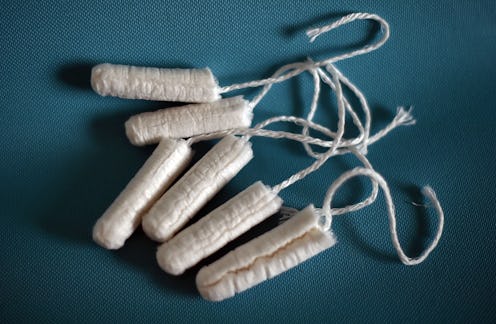Life
The Period Stigma In India Reportedly Led To This 12-Year-Old Girl's Suicide

Early on Sunday morning in Tamil Nadu, India, a 12-year-old girl allegedly killed herself after menstrual shaming at school. According to BBC Tamil, police are still investigating the matter, but the unnamed girl's mother has attributed it in part to an incident that took place the previous day. She claims her daughter's period began during class on Saturday, and she was given a duster cloth to use as a pad. When period blood stained her clothes, the student was reportedly forced to leave the classroom and stand outside. The next day, she committed suicide, leaving behind a letter accusing her teacher of "harassing and torturing" her.
"I do not know why my teacher is making complaints against me," she wrote in the alleged suicide note. Her mother also says the teacher had punished the girl in the past for not doing her homework. Speaking to the BBC, she asked, “How can a 12-year-old withstand such humiliation?”
Menstrual taboos are still prevalent in India. Women are considered impure and dirty during their period, and as such, their activities are heavily restricted. In some areas, they aren't allowed in the kitchen during their period; in others, they may be banished to live in a hut. Many Hindu temples prohibit women on their periods from entering, and even speaking about menstruation is heavily discouraged. Meanwhile, menstrual hygiene is sorely lacking in some areas, which is linked to health issues like increased risk for infection and skin irritation.
"With too little support to handle their periods, women and girls have reported staying home from school, missing work, banishment by families, and humiliating treatment in their communities," explains the Human Rights Watch. According to UNESCO, more than 20 percent of girls in India drop out of school after reaching puberty.
Such menstrual stigma can disrupt not just a girl's education, but her entire life, and as the tragedy in Tamil Nadu shows, this can have devastating consequences.
Sadly, this is one of many incidents demonstrating the strength of menstrual stigma in India. In March, 70 students were allegedly strip-searched to check if any were on their period after blood was found in the school bathroom. (After protests from the girls' families, the warden was suspended.) Around the same time, a Congressional leader publicly stated that "menstruation is impure." In July, the Indian government moved to place sanitary pads in a 12 percent tax bracket for non-essential items, while sindoor, a traditional red powder usually used by married women, is exempt.
The good news is that activists and schools are working to change prevailing beliefs. Menstrupedia, an illustrated guide to periods created by a couple several years ago, has grown into an entire organization dedicated to educating girls about their bodies. In 2014, a man in southern India invented a machine for women to make cheap sanitary pads, despite costs to his personal life. Since 2015, Indian women have protested menstrual taboos with the #HappyToBleed hashtag.
Centuries, if not thousands of years, of period shaming will not disappear overnight, but the taboo has a huge impact on the lives of millions of women and girls. Menstruation is a natural part of life — how long will it take before it's treated as such?